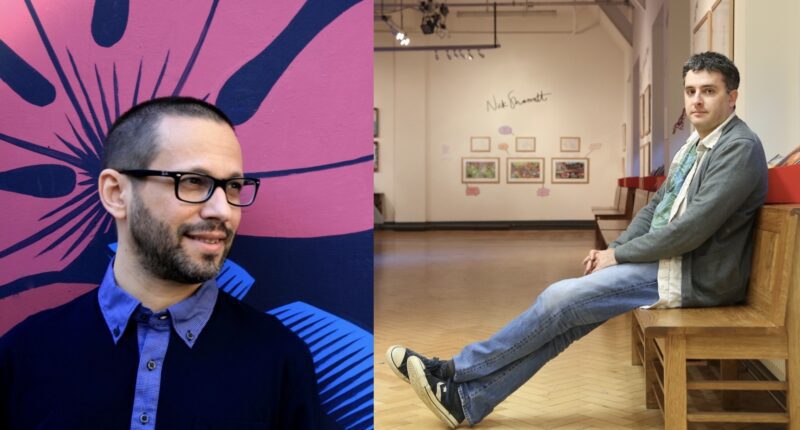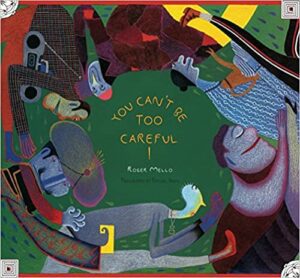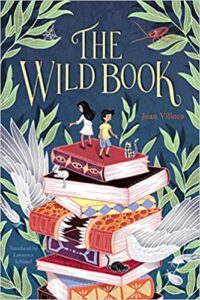Translators of Children’s Books Take Center Stage
This Tuesday, June 2 at 1:30 pm ET, the “Translating the Future” conference turns to children’s books, with a conversation between Lawrence Schimel and Daniel Hahn that I am moderating, titled “Translating for the Future.” Since I joined the organizing team two years ago, I’ve advocated for the inclusion of a panel on children’s literature in translation, my argument being that we need to reach our readers as early as possible if we want them to be receptive to international literature in translation as adults. Reading habits and preferences form early, and ignoring the world of children’s literature leads to lack of interest in translated literature as adults.
We are fortunate to present this conversation among two of the most prominent and acclaimed translators of children’s literature into English today. Both Schimel and Hahn also translate for adult readers, and Schimel, who lives in Madrid, Spain, has translated children’s books into Spanish and is the author of poetry, fiction, and picture books. Hahn, who lives in the U.K. and translates from Portuguese, Spanish, and French, is an activist and scholar as well, the former head of the Society of Authors and the author of The Oxford Companion to Children’s Literature.

Lawrence Schimel (photo by Nieves Guerra) and Daniel Hahn (photo by John Lawrence).
The panel description reads:
Translators of children’s literature—always read by both adults and children— face various unique challenges, including the potential for bi- or multilingualism, the incorporation of illustrations, and differing cultural taboos or views of what is and isn’t appropriate for children. Many classics of children’s literature (The Little Prince, Pippi Longstockings, the Grimm & Andersen fairy tales, etc.) are read in translation, even if they’re not treated as such the way adult books in translation would be. Are translators of works for children “translating for the future” by helping them to develop empathy and learn about other cultures in our globally-connected world, or are they simply sharing universal stories full of delight and emotion that hopefully create lifelong readers?
Two weeks ago in their panel “Translating the Uncertain Present,” Madhu Kaza and Lina Mounzer talked about the tension between reflecting the original language and culture and making the translated work accessible to those who are reading the book in translation. We’ll talk about how this balance shifts when the readers are children and teenagers, who may have fewer cultural references but a greater openness to the world.
As I was contacting the participants and putting together the panel, I received a email from one of the conference organizers expressing concern about the size of the audience for this panel. I promised to contact people in my network, mostly through the Society of Children’s Book Writers and Illustrators, who now have an active and enthusiastic section of translators along with thriving international chapters. They have been wonderful in helping to get the word out, but it’s made me think of what a tight-knit community we translators of children’s books are, and how there isn’t enough interaction between us and the larger community of literary translators. ALTA, the American Literary Translators Association, does not generally have panels that explore translation of books for children and teens. Undergraduate and graduate programs in translation, at least in the U.S., don’t focus on translating literature for young readers, and MFA programs in writing for children and teens generally don’t have courses dealing with translation. We need to change how children’s literature is viewed from within the translation community, and I see this panel as a first step to achieving this goal. I hope that a high attendance, and people returning to view the videorecording, will convince people in the translation community that translation of literature for children and teens deserves a place at the table and more than one chance to take center stage.
Here’s the listing for the event on the Center for the Humanities website:
https://www.centerforthehumanities.org/programming/childrens-literature-in-translation
Event on Facebook:
https://www.facebook.com/events/2567952126790310
Eventbite link where people can Register (and please do register, because it makes signing in much easier, as I found out last week):
And here is the page at Howlround where the event will actually stream: https://howlround.com/happenings/livestreaming-translating-future-childrens-literature-translation
As always, you may send your questions beforehand or during the event here: [email protected].
 Finally, the kind people at the PEN Children and Young Adult Books Committee, who are also helping to promote this event, have asked me to include a bibliography of notable translations by the participants. Here are a couple of recommendations:
Finally, the kind people at the PEN Children and Young Adult Books Committee, who are also helping to promote this event, have asked me to include a bibliography of notable translations by the participants. Here are a couple of recommendations:
Daniel Hahn translated:
Acioli, Socorro, The Head of the Saint. Delacorte, 2016. Young adult.
Mello, Roger. You Can’t Be Too Careful! Elsewhere Editions, 2017. Picture book. Mildred L. Batchelder Award honor book.
 Lawrence Schimel translated:
Lawrence Schimel translated:
Ofono, Trifonia Melibea. La Bastarda. Feminist Press of the City University of New York, 2018. Young adult. Global Literature in Libraries Best Translated YA Award honor book.
Villoro, Juan. The Wild Book. Yonder, 2017. Middle grade.






